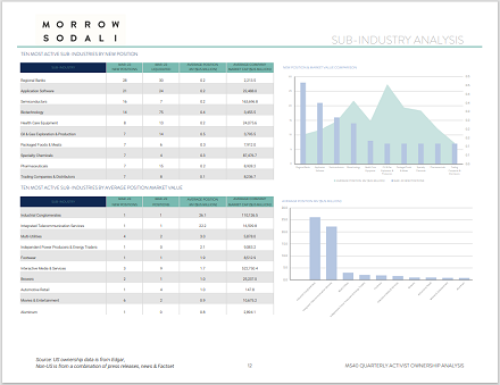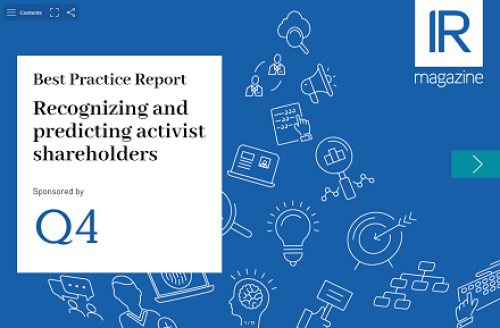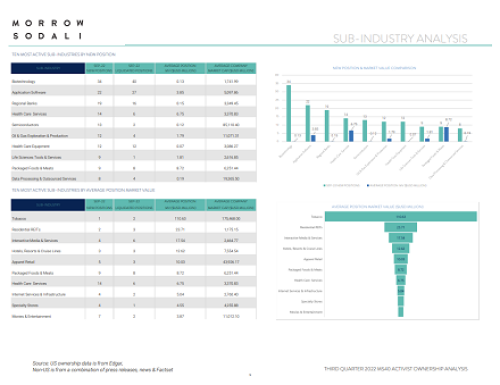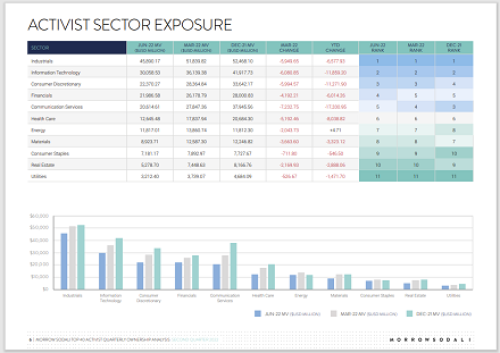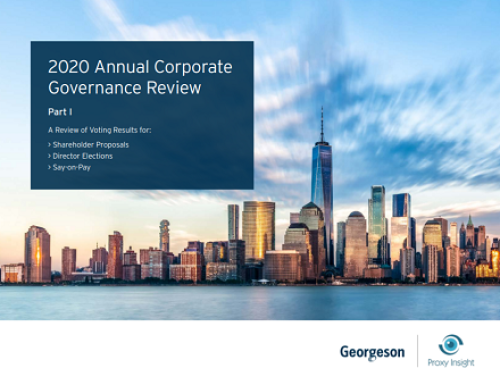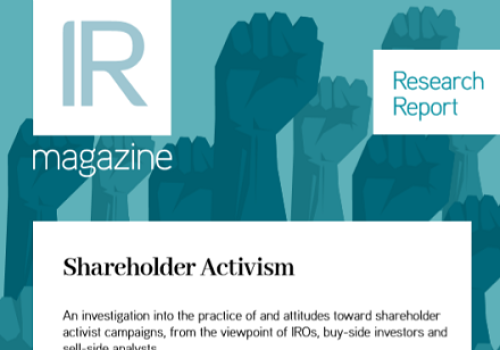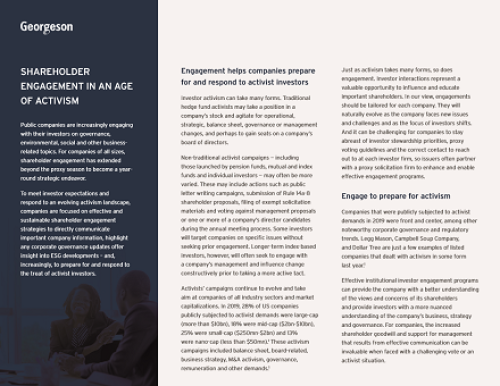– Reuters reported that ISS-backed cloud storage vendor Box in its fight with activist investor Starboard Value by recommending that shareholders vote for the company’s directors instead of the hedge fund firm’s nominees. In its report, ISS said shareholders should vote for Box directors Peter Leav and Aaron Levie, arguing that the existing board has made sensible changes and should get more time to effect a turnaround. Earlier this year, Starboard nominated four directors to Box’s 10-person board, saying that the company failed to capitalize on the work-from-home trend during the Covid-19 pandemic.
– The UK’s Liberal Democrats proposed a plan to end new listings of fossil fuel companies, reported the Guardian. The party said the plan could help the UK become a leader in tackling the climate emergency. Under the plan outlined to the paper by Lib Dem leader Ed Davey, another immediate policy would be to stop new bonds being issued in London to finance oil, coal or gas exploration. Fossil fuel firms already listed in the UK would then have two years to produce a coherent plan about how they would reach net-zero emissions by 2045, or risk being struck off the London Stock Exchange. In the longer term, pension funds would have to disinvest from fossil fuels by 2035, and all companies with fossil fuel assets would be removed from the exchange by 2045.
– The SEC is investigating Deutsche Bank’s asset-management arm, DWS Group, after the firm’s former head of sustainability said it overstated how much it used sustainable investing criteria to manage its assets, noted The Wall Street Journal (paywall) on Wednesday. Authorities’ examination of DWS comes after the paper reported that the $1 tn asset manager ‘overstated’ its sustainable investing efforts. The WSJ, citing documents and the firm’s former sustainability chief, said DWS struggled with its strategy on ESG investing and at times painted a ‘rosier than reality’ picture to investors. After declining to comment on the initial story, DWS issued a statement to the press late on Thursday, which said the allegations were ‘unfounded’ and that the firm ‘stands by its annual report disclosures’. It added: ‘We firmly reject the allegations being made by a former employee.’
– In related news, the Financial Times (paywall) reported that funds marketed as ‘climate themed’ often hold shares in large polluters including big oil companies, and many are inconsistent with the goals of the Paris agreement despite claiming to be aligned with it, according to analysis by think tank InfluenceMap. About 72 of the 130 climate-focused funds examined – which collectively hold more than $67 bn in assets and are managed by leading investment houses including BlackRock and State Street Global Advisors – were found to be misaligned with the Paris agreement goal of limiting global warming to well below 2°C. Collectively, the 130 funds held $153 mn in fossil fuel production chain companies, according to the report. Both a State Street ‘fossil fuel reserves-free fund’ and a BlackRock ‘fossil fuel-screened fund’ held shares in Marathon Petroleum and Phillips 66.
– The BBC reported that the UK’s Frasers Group, run by the controversial Mike Ashley, has offered the retail tycoon’s future son-in-law a £100 mn ($137 mn) bonus – but only if he can more than double the share price. The group has put forward the bonus plan for Michael Murray when he becomes Frasers chief executive in May 2022 but he will collect only if its share price reaches £15 for 30 trading days in a row before October 2025, up from its current level of about £6.50. The company described the target as ‘challenging but achievable’. Murray, aged 31 and engaged to Ashley’s daughter Anna, is currently ‘head of elevation’ at Frasers and is in charge of modernizing stores and transforming the business. The board of Frasers Group, which owns high street chains Sports Direct and House of Fraser, said it had also recommended a £1 mn annual salary for Murray. Shareholders are set to vote on the proposed bonus scheme at the group’s annual general meeting on September 29, with Ashley set to step down as CEO – but remain on the board as an executive director – when Murray takes over.
– According to Reuters, India has fewer ESG funds than other top 10 economies. The world’s sixth-largest economy has 23 ESG funds, Refinitiv data shows, compared with the US and UK, which have more than 500 each. Japan has 182 and China has 119. Other economies in the top 10 also have more ESG funds. ‘Indian investors are not completely attuned to the concept of sustainable investing, unlike global markets led by Europe, where sustainable investing has been present for many years,’ said Kaustubh Belapurkar, director at Morningstar India. Analysts said investors were reluctant to put cash into ESG funds as most funds in the sector were new and could not show a track record of outperformance.
– The FT reported that Brussels is set to launch a formal competition probe early next month into Nvidia’s planned $54 bn takeover of British chip designer Arm, after months of informal discussions between regulators and the US chip company. The paper said the investigation is likely to begin after Nvidia officially notifies the European Commission of its plan to acquire Arm, with the US chipmaker planning to make its submission in the week starting September 6, citing people with direct knowledge of the process. The people added that the date might yet change, however.
Brussels’ investigation would come after the UK’s Competition and Markets Authority (CMA) said its initial assessment of the deal suggested there were ‘serious competition concerns’ and that a set of remedies suggested by Nvidia would not be sufficient to address them. The UK watchdog said it feared the deal could ‘stifle innovation across a number of markets’ including by giving Nvidia the power to hurt its rivals by limiting their access to Arm’s technology. Nvidia announced a plan in September last year to buy Arm from SoftBank, the Japanese investment conglomerate.
– Elsewhere, Best Execution reported that the CMA is launching an inquiry into S&P Global’s proposed £33 bn takeover of IHS Markit. The antitrust regulator said it is considering whether the deal would hurt competition within the UK. The CMA said it has set October 19 for its decision as to whether to refer the merger to a phase II investigation. S&P announced last November that it had agreed to buy London-based IHS Markit in an all-stock transaction. Combined, the two companies would create one of the largest data providers, rivalling behemoths Bloomberg and Refinitiv.
– Reuters reported that SEC chair Gary Gensler said the agency will seek input on whether digital customer engagement innovations used by financial services firms should be governed by existing rules or may need new ones. Although the SEC’s considerations on the subject are at an ‘early stage’, its rules may need updating to account for an artificial intelligence (AI)-led revolution in predictive analytics, differential marketing and behavioral prompts designed to optimize customer engagement, he said.
‘We’re at a transformational time. I really believe data analytics and AI can bring a lot of positives, but it means we should look back and think about what [this means] for user interface, user engagement, fairness and bias,’ Gensler said. ‘What does it mean about rules written in an earlier era?’ The consultation was partly sparked by January’s meme stock saga, which resulted in intense scrutiny of retail broker practices, including ‘gamification’ – game-like prompts designed to optimize customer engagement.
– CityWire reported that the UK’s Financial Conduct Authority (FCA) said it is not capable of effectively supervising Binance, the world’s largest cryptocurrency exchange, after the platform refused to provide basic details about its operations. Binance is an online broker specializing in digital currencies with a monthly turnover of tens of billions of dollars. It was censured by the FCA in June and asked to comply with a number of requests by the end of that month. The FCA has now said Binance failed to provide vital information including details about how the business is organized and how UK customers could use the platform, and did not identify the legal entity behind its website. ‘The FCA considers that the firm’s responses have been incomplete and have included direct refusals to provide information,’ the watchdog said in a report.
– Reuters (via CNBC) reported that, according to a document it had reviewed and people familiar with the matter, the SEC has started to issue new disclosure requirements for Chinese companies seeking to list in New York as part of an effort to raise investor awareness of the risks involved. Some Chinese companies have started to receive detailed instructions from the SEC about greater disclosure of their use of offshore vehicles known as variable interest entities for IPOs, implications for investors and the risk that Chinese authorities will interfere with company operations. Gensler last month asked for a ‘pause’ in US IPOs of Chinese companies and sought more transparency about these issues. Chinese listings in the US came to a standstill after the SEC freeze. An SEC spokesperson did not immediately respond to a request for comment.


